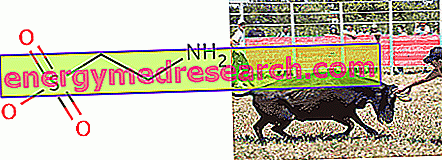What is Taurine
Taurine is a conditionally essential amino acid that is added to many energy supplements and drinks. From a biological point of view, taurine is different from the twenty alpha amino acids that form proteins due to the presence of sulfonic acid (SOOOH) instead of the traditional carboxyl group (COOH).
Taurine plays a fundamental role in the synthesis of bile acids; these acids, produced in the liver and incorporated into the bile, derive from cholesterol and facilitate their elimination. Bile is also essential for the digestion of fats and for the absorption of fat-soluble vitamins.
Along with zinc, taurine is also important for vision and eye health
Taurine is particularly concentrated at the level of white blood cells, skeletal muscles, heart and central nervous system (it regulates the transmission of nerve impulses and stabilizes cell membranes).
In the medical field it is used in the treatment of epilepsy, taking advantage of its moderate sedative properties.

Taurine was first isolated in 1827 from the bile of a bull, where it was found in high concentrations
Taurine in food
Taurine is present in eggs, fish, meat and milk, but not in foods of plant origin. In the adult organism, taurine can however be synthesized in the liver starting from cysteine and methionine (two other amino acids) in the presence of sufficient amounts of vitamin B6.
Taurine supplementation could therefore be useful in vegetarians, although the two precursor amino acids (cysteine and methionine) are found in fairly large quantities also in legumes.
Infants, on the other hand, are unable to synthesize the taurine themselves, which they obtain from their mother's particularly rich milk.
Taurine is currently considered a conditionally essential amino acid since in particular circumstances it may not be synthesized at sufficient speed to meet the body's metabolic demands (high psychophysical stress, heart attacks).
Other functions
Taurine counteracts the aging process thanks to its anti-free radical action. This precious amino acid is also important for the synthesis of nitric oxide, a powerful vasodilator agent.
In sport, taurine seems to stimulate cardiac efficiency and contractility by increasing myocardial blood supply.
In the aesthetic field it is used to restore strength and vitality to the hair.
Other possible applications of taurine in the medical field are: cardiovascular diseases, male infertility (due to poor sperm motility), hypercholesterolemia, epilepsy, diabetes, macular degeneration, Alzheimer's disease, liver disorders, alcoholism and cystic fibrosis.
Regarding the intake of taurine as a useful supplement to maximize muscle development induced by power training, the rationale could lie in its osmotic effect at the intracellular level, which stimulates the entry of water into the cell and indirectly protein synthesis.
Intake doses
Taurine is used in doses of 2 to 8 grams per day (often distributed in three daily intakes). It is usually found in supplements in combination with other substances such as antioxidants, calcium, magnesium and a good mix of vitamins.
Side effects
The side effects of chronic taurine use are still not well documented. There are studies awaiting confirmation that indicate that an excess of taurine in adults causes hypertension and gastrointestinal problems (diarrhea and peptic ulcer).
It also appears that the consumption of foods rich in taurine contributes to aggravate psoriasis (appearance of itching, scales and spread of lesions).



